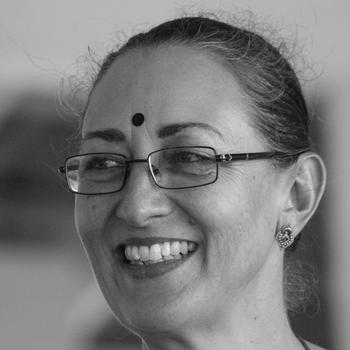Hanne de Bruin

Interweaving Performance Cultures
Fellow 2015/16, 2016/17, 2017/18
Johanna (Hanne) M. de Bruin (1959) holds a Ph.D. in Indology from the University of Leiden, Netherlands. Her research and practical work covers different popular theatre forms in rural Tamil Nadu, including Kattaikkuttu, drama and the rural Devadasi tradition. She has a special interest in the (stigmatized) position and contribution of women performers to the rural stage, the role of elementary education in the formation of rural children in Tamil Nadu, and issues revolving around social stigma. Her publications include the Tamil version and English translation of an all-night Kattaikkuttu play, Karṇa Mōkṣam or Karṇa’s Death: A Play by Pukalentippulavar (1998), Kaṭṭaikkūttu: The Flexibility of a South Indian Theatre Tradition (1999) and Leprosy in South India: Stigma and Strategies of Coping (1996). She edited a Seagull Theatre Quarterly Special Issue on Hybrid Theatres in India (2001) and co-edited the monograph Between Shame and Fame: Performing Women & Women Performers in India (2011) with Heidrun Brückner and Heike Moser. Together with her husband, Kattaikkuttu actor, director and playwright P. Rajagopal, she founded the Kattaikkuttu Sangam (1990), a grassroots association of professional performers, and the Sangam’s ground-breaking project, the Kattaikkuttu Gurukulam (2002). Since 2001, Hanne has been working full-time for the Sangam, initially as facilitator and more recently as its executive director, programme director and principal fundraiser. She is involved in the Gurukulam’s day-to-day artistic, educational and financial management and accompanies its new productions as a dramaturg and costume designer. She has curated three large scale rural festivals of the Sangam in 2000, 2005 and 2015, offering equal space and time to performing art forms without labelling each as folk, traditional, classical or modern/contemporary. These festivals offered rural audiences access to South Indian theatre, dance and puppetry forms that normally remain outside their sphere of contact, and allowed urban/international spectators to witness Kattaikkuttu’s vibrant performance scene. Hanne is a member of the India Theatre Forum and an alumni of the ATSA arts management course instituted by the South Asian network of the Goethe Institutes, New Delhi.
www.kattaikkuttu.org
Research Project
Recycling Performance:Towards an Alternative Historiography of the Popular Stage in Tamil Nadu, India
Current scholarship is in need of a sensitive re-examination of the recent history of rural drama in Tamil Nadu (India) to take into account the richness, aliveness, and interaction of rural, popular performance forms through intricate processes of the interweaving of dramatic material and media, and to acknowledge the contribution and opinions of its local stakeholders. Looking in particular at three distinct but interlinked rural performance forms — Kattaikkuttu, the now defunct rural Devadasi tradition, and the Natakam theatre — I hope to build an alternative, more nuanced and sensitive historiography of the popular stage in North Tamil Nadu in order to counteract the existing, simplified image of a deteriorated rural stage and the validation of these forms as crude, rude and incompatible with India’s projected image of modernity. Such an alternative historiography needs to look closely at the contribution of rural female performers (as well as the performance and performers of female roles), in particular in the light of a general opinion that has denied the presence of women on the rural stage.
The aliveness of the rural stage is reflected in the interweaving of performance forms―with each other, with popular expressions of rural religion/religiosity, politically expressed forms of secularity and with the modern entertainment industry―and the differentiation of these forms from each other in their search for validation and identity. Their social and economic histories are pivotal to the shaping of their specific form, content, praxis and purpose of performance, which in turn helps determine their placement and survival within the local as well as global competitive field of the performing arts.
Whilst survival has not been successful for all three genres, it is greatly influenced by a form’s capacity for transmission and change. As part of the project I will look into the process and effects of formalizing the transmission of Kattaikkuttu by the Kattaikkuttu Gurukulam and the creation of new artistic work within an institutionalized setting. This will involve looking at the way Kattaikkuttu works at a practical, aesthetic and performative level, as well as at the distinctions which stakeholders feel are important to identify and circumscribe the transformative power of their performance. It will bring to the fore the question of the existence of a rural artistic contemporaneity, as well as its nature and the criteria by which it might be described.
Recommended Publications
- De Bruin, Hanne M., Kattaikkuttu: The Flexibility of a South Indian Theatre Tradition, Groningen: Egbert Forsten, 1999.
- De Bruin, Hanne M., "Contextualising Women and Performance in India", in Heidrun Brueckner, Hanne M. de Bruin and Heike Moser (eds.), Between Fame and Shame: Performing Women - Women Performers in India, Wiesbaden: Harrassowitz Verlag, 2011, pp. 11-35.
